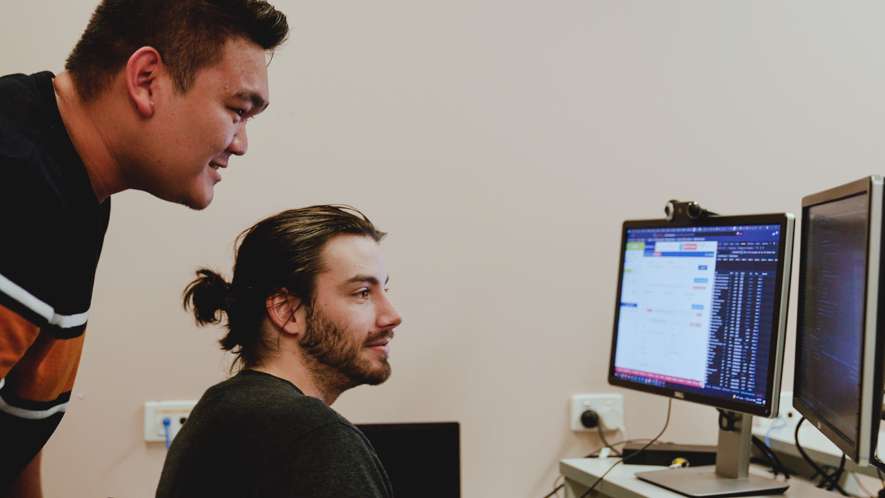
Kickstart your IT career with our Bachelor of Information Technology and benefit from real-world experience and the support of our experienced course leaders. Develop in-demand industry skills valued by employers through authentic learning experiences.
Within this highly practical degree, you'll develop a broad foundation of IT knowledge and skills, plus gain access to work-integrated learning opportunities that prepare you for a successful IT career. Designed with input from our industry partners, benefit from innovative, up-to-date and industry-relevant units, as well as in-built practical experiences.
During your studies, your core units will provide you with a comprehensive understanding of key IT and computer-based systems areas. From your second term, you will begin to study units from your chosen major:
Customise your studies further with a wide range of minors, offering depth in complementary disciplines and aligning with emerging IT fields to align with your career aspirations. Minors include:
Learn more about each major and minor in the Structure & Availability section below.
In your final year, you will complete a project or internship. If you choose the capstone project unit, you'll enhance your collaboration skills in the production of project management artefacts typically required of a small-scale commercial project appropriate to your major. Alternatively, the internship allows you to gain real-world experience before you graduate and multiply your professional networks.

Discover more about your industry-accredited IT course and how you'll benefit from flexible study options and practical experiences to support your learning. Click 'Explore Study Experience' for more information.

I decided to study Information Technology because you can study a wide range of areas, which gives you a chance to discover what you're good at and like the most. I was a bit nervous because I'd been out of high school for a while, but the group I was in was great.
Erin Lewis
Bachelor of Information Technology
On completion of the Bachelor of Information Technology you will be qualified to work in both public and private sectors and in roles such as:
The course structure and available locations can change depending on when you want to study. You can choose the intake that best suits you in the drop-down menu below.
You must complete 23 units (144 credits):
The units you'll study are listed below. Click on a unit to learn more.
You will study the eight units listed below.
You might be required to enrol in some units in online mode depending on the campuses. Term 3 units are not offered on some campuses. If you want to study in Term 3 on the campus at which a unit is not available, you will need to enrol in online mode.
The Application Development Major consists of seven of the eight units listed below.
In your final term, you will choose a Stream and complete only one of the following:
Learn more about each Stream in the Study Experiences section.
Application Development involves using tools, techniques, and programming languages to develop systems. In this major you will study concepts such as the architectural design of an application including how to break up an application and distribute its components across a networked system, and the development of mobile and internet applications. You will become an advanced, enterprise-ready developer.
You might be required to enrol in some units in online mode depending on your campus. Term 3 units are not offered on some campuses. If you want to study in Term 3 on a campus for which the unit is not available, you will need to enrol in online mode.
The Animation and Motion Graphics Minor consists of the four units listed below.
This minor includes units of study in animation, motion graphics, 3D computer graphics and 3D character design. You will develop skills with industry-standard software tools such as Autodesk Maya, Adobe After Effects and Adobe Photoshop.
This minor is available to all majors.
You might be required to enrol in some units in online mode depending on your campus. Term 3 units are not offered on some campuses. If you want to study in Term 3 on a campus for which the unit is not available, you will need to enrol in online mode.
You can choose four electives units.
Electives may include any unit from the Bachelor of Information Technology majors or minors provided all prerequisites have been met. At least one of your electives must be a Level 3 unit.
You might be required to enrol in some units in online mode depending on your campus. Term 3 units are not offered on some campuses. If you want to study in Term 3 on a campus for which the unit is not available, you will need to enrol in online mode.
To help you plan your studies and see which unit comes first, if one unit should be completed before another and the term you will study each unit, check out our course planners.
The Bachelor of Information Technology (Cyber Security) is accredited by the Australian Computer Society (ACS) at the professional level.
https://www.acs.org.au/cpd-education/accredited-courses.html
The Bachelor of Information Technology (Business Analysis) is accredited by the Australian Computer Society (ACS) at the professional level.
https://www.acs.org.au/cpd-education/accredited-courses.html
The Bachelor of Information Technology (Application Development) is accredited by the Australian Computer Society (ACS) at the professional level.
https://www.acs.org.au/cpd-education/accredited-courses.html
Students will complete an industry internship, typically comprising 32 hours per week over a period of 10 consecutive weeks, with an approved host organisation. This provides a structured work-integrated learning experience that supports the development of professional skills in real-world settings.
Students have the option to undertake capstone units instead, which involve industry-based projects, allowing them to apply disciplinary knowledge to authentic workplace challenges.
If you have completed prior study relevant to units within this course, you may be eligible for credit for your past studies.
For your application to be considered, you must meet the following entry requirements.
View the student and course profiles for this course and learn about CQU's Undergraduate Profile for Term 1, 2025 via our Institute Profile.
CQU offers a range of alternative entry pathways to help you get started. If you don’t meet the entry requirements, there are options available, depending on your background and previous experience.
While not needed to apply, you'll need to meet the following requirements throughout your studies.
The Indicative First-Year Fee is the approximate cost of enrolling in this course for one full-time academic year (eight units over two terms) for a Commonwealth Supported Place (CSP) and should be used as a guide only. Your actual fees may vary depending on the units you select to study and your study load. Check the Cost per Unit spreadsheet available on our Understanding Course Fees webpage.
Fees are reviewed each year and are subject to change. Fee estimates for the following year are expected to be available in September each year.
This course has Commonwealth Supported Places (CSPs) available, and as a domestic student, you'll be offered a CSP, provided you meet CSP eligibility requirements. CSPs are subsidised by the Australian Government, meaning you are only required to pay the student contribution rather than full tuition fees.
You may be eligible for a HECS-HELP government loan if you are offered a CSP. HECS-HELP is an Australian Government loan scheme that assists you in paying your student contributions. Provided you meet the HECS-HELP eligibility criteria, you may use HECS-HELP to defer part or all of your student contribution fees.
Part of your course costs will include Student Services and Amenities Fees (SSAF). SSAF is charged in addition to your student contribution or tuition fees and is used to help enhance your study experience. There may also be other costs as part of your studies, such as textbooks, technology expenses, travel expenses, professional certifications, uniforms, or vaccinations.
We believe a quality education can be for everyone – regardless of background, location, or life circumstances. That's why we offer a variety of scholarships and bursaries that can give you a helping hand with a range of expenses and enhance your employability.
Check what you need to do to apply to study this course.
Prior to applying, take a look at important application dates and learn about our admission considerations, such as information for domestic students with overseas qualifications, indigenous support, and elite athlete, coach and performer support. You should also check out the adjustment schemes that might be available to you and how to access them. You can also explore our offer information to learn more about what happens after you've submitted an application and how to respond to an offer to study with CQU.
When applying through a tertiary admissions centre (TAC) you can use the relevant TAC code below to search for a course or add it to your application preferences.
CQUniversity Australia is a trading name of Central Queensland University
ABN: 39 181 103 288
RTO Code: 40939
CRICOS: 00219C
TEQSA: PRV12073